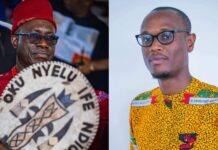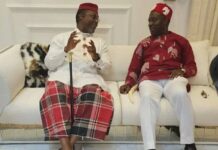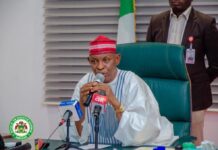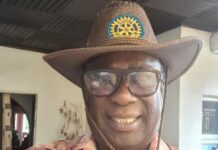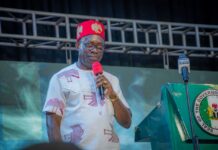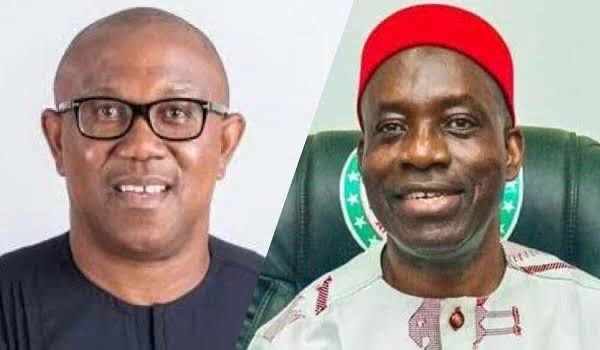The compelling virtue of the Afenifere endorsement of the Labour Party presidential candidate, Peter Obi and the countervailing tirade of the Anambra state governor, Charles Soludo, can be reduced to the theoretical distinction between patriotism and nationalism. Unlike nationalism,patriotism is not a function of racial/ethnic identity. It is a conscientious Yoruba and good Nigerian who concludes that it is the turn of the Igbo to be the beneficiary of the observance of power rotation to the South.
All cultures are ennobled by the application of the fundamental scriptural dictum ‘to love your neighbour as you love yourself’. Conformity with this etiquette requires us to take the position that within the context of the principle of power rotation, the rotation to the South this time around should be attributed to the South East zone. It bears restatement that of the three zones comprising the South namely the South West, South South and South East, it is the latter that has not had the privilege of providing the Nigerian President. It is a categorically simple and clear ethical position and a fulfilment of the logic of the prior power rotation between the North and South. And any contrary position fails to stand-to the extent of its incompatibility with the universally applicable principles of fairness, equity and justice.
Consistent with the underlying bad faith of his entire tirade against Obi, Governor Soludo advocates that the rule of engagement with Nigerian politics for Ndigbo should be the prioritisation of the ideology of the politics of consumption over the sacrificial politics of development; of cynicism over hope; of nationalism over patriotism; of selfishness over altruism. The kind, according to him, that the Yoruba is purportedly playing in cahoots with Bola Ahmed Tinubu. He lamented “When will Ndigbo understand and learn politics, especially of Nigeria? When Bola Ahmed Tinubu defied the political wind of the time and stood out as the “only man standing” in AD and later AC (before ACN) against a sitting president of Yoruba descent, no one accused him of being “anti-Yoruba”. Indeed, everyone recalls that both Tinubu and President Obasanjo disagreed politically, and probably still disagree—but none is being accused of being “anti- Yoruba”. Under Tinubu, the South West strategically organized under a different political party, the ACN and went into a formidable alliance that kicked out a sitting president (in Africa?), and that alliance is not broken yet”
Here Soludo took to playing the all-knowing and wisecracking patriarch trying desperately to reorient a straying family entourage to the path of political salvation. It was typically a sham. Ndigbo had indeed pursued his prescriptions; the problem is that on those occasions they took the prescriptions, it often ended as a cure worse than the disease. When in 1960, Dr Nnamdi Azikiwe shunned Chief obafemi Awolowo and sought comfort in the expansive embrace of the Northern Peoples Congress, NPC, whose prescription was he heeding? When Dr Alex Ekwuemejoined the ticket of Shehu Shagari in opposition to that of Awolowo and Philip Umeadi in 1979 what kind of politics was he signifying?
When Ikemba Emeka Ojukwu came back from exile in 1979 and got lured into so calledmainstream politics of the National Party of Nigeria, NPN, to contest for the Senate, how did the romance end? Did all become rosy for Ndigbo thereafter? Where did Soludo get this idea that the ‘Yoruba strategically organized themselves under Tinubu’? How does this assumption square with the reality of the failure to contrive an endorsement of Tinubu as the Yoruba candidate at Akure the other day. Not to talk of the demystifying defeat (by proxy) he suffered at the Osunstate governorship election (at a time he needed to validate his perception as the strong man of Yoruba politics). If indeed the Yoruba strategically organized themselves under Tinubu, then such strategy has left the Yoruba worse off-given the nightmarish experience of the past seven years.
Peer rivalry and competitiveness is the natural order of human societies, so there is nothing wrong in Soludo craving the soaring glory of his rival but leadership is inclusive of the ability to manage frustrations and disappointment with grace not with Freudian incontinence. What I find particularly galling was the recourse to the mercenary misappropriation of Nigeria’s political experience especially the analogy of rival regional contenders and serve it (a la carte) as a model political behaviour deserving of emulation. Invariably, such recommended behaviour panders to the degenerate power politics status quo and sees political virtue in following the multitude to do evil, to join them if you cannot beat them.
Before the villainy of plunging the killer dagger into the heart of his mentor, Brutus bequeathed to the world a memorable quote “there is a tide in the affairs of men which taken at the flood leads on to fortune”. In its magnitude and velocity I doubt if many of us saw this contemporary tide coming. The only contribution Obi has made has been the ability to seize the moment. Others like the former governor of Cross River state, Donald Duke lent the metaphysical perspective that ‘the stars have perfectly aligned for Peter’. To recap
You can be a Yoruba nationalist without being a good man but you cannot be a good Yoruba if you are not a good man. In their savage genocidal cruelty, the former Serbia warlords Slobodan Milosevic and Ratco Mladic were exemplars of Serbian nationalism and so was their German nationalist counterpart, Adolf Hitler. In this electoral cycle, you would have heard some of the presidential candidates making the good-to the -ear illustration that we all equally suffer from nature’s vicissitudes and commonly enjoy the dubious regime of oil subsidy. That the Fulani do not buy food cheaper in the market than the ibibio. That the adversity of the power outage dysfunction is commonly visited on Nigerians regardless of whether you are Tiv or ikwere. Andbefore Mr Peter Obi is adjudged a potentially good Nigerian president he must have been a good governor of Anambra state and good Igbo.
On the polemical juxtaposition of nationalism and patriotism, President Emmanuel Macron of France has been my unlikely teacher. It was from him that I learnt there is a nuanced contraposition between patriotism and nationalism, that the former is good while the latter is bad. That nationalism belongs in the same category as tribalism. You might have noted that with the advent of Donald Trump and the American first nationalism mantra, American politics was trending towards racism. Tribalism, nationalism, racism, xenophonia, intolerance, isolationism, expansionist military crusades, enacting anti-immigrant policies and extreme right radicalism are all members of the same family. From the little beginnings of the muster, seed of nationalism sprouts the monstrous oak of fascism. Take a bow Donald Trump, Benito Mussolini, Adolf Hitler, Vladimir Putin, Marie Le Pen ad nauseum
Extrapolating from the resurgence of ultranational chauvinism in contemporary Europe and elsewhere, Macron shared the insight that patriotism is ‘the exact opposite of nationalism: nationalism is a betrayal of patriotism’. He agonised that the old demons of nationalism are resurfacing, ready to finish off their work of chaos and death. That history often threatens to retake its tragic course and threaten our heritage of peace that we believed we had definitively settled with our ancestors’ blood.” It is important not to confuse nationalism with patriotism. Whereas the encyclopedia defines, patriotism as a healthy pride in your country (or your ethnic identity) which brings about feelings of loyalty and a desire to help other citizens, nationalism (or tribalism) is the belief that your country or nation is superior, without question or doubt. The difference between patriotism and nationalism is simple – a patriot loves his country and is proud of it for what it does whereas a nationalist loves his country and is proud of his country NO MATTER WHAT IT DOES.
